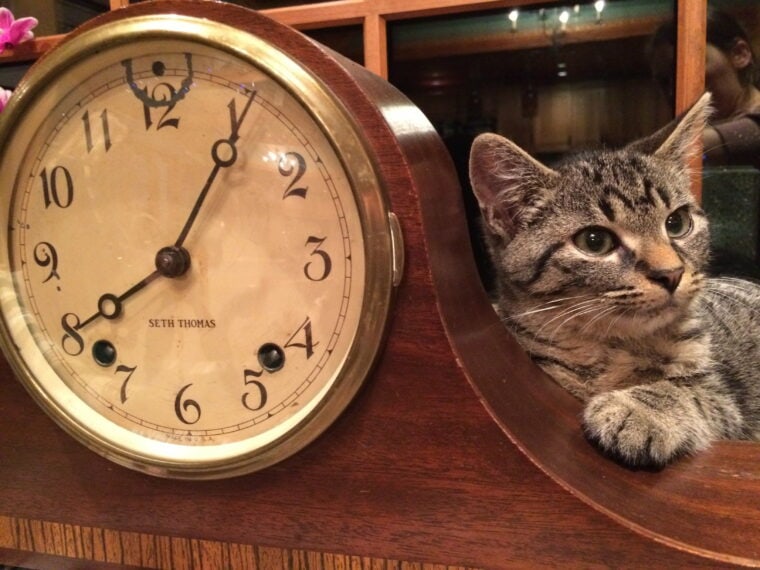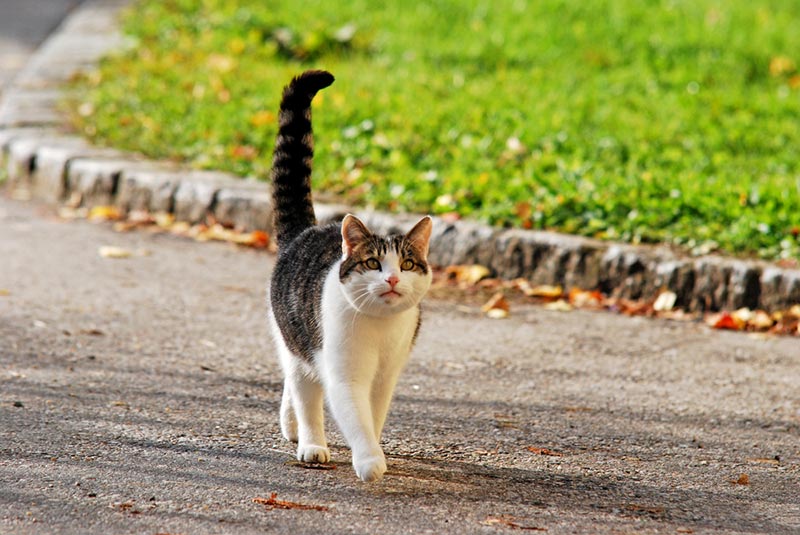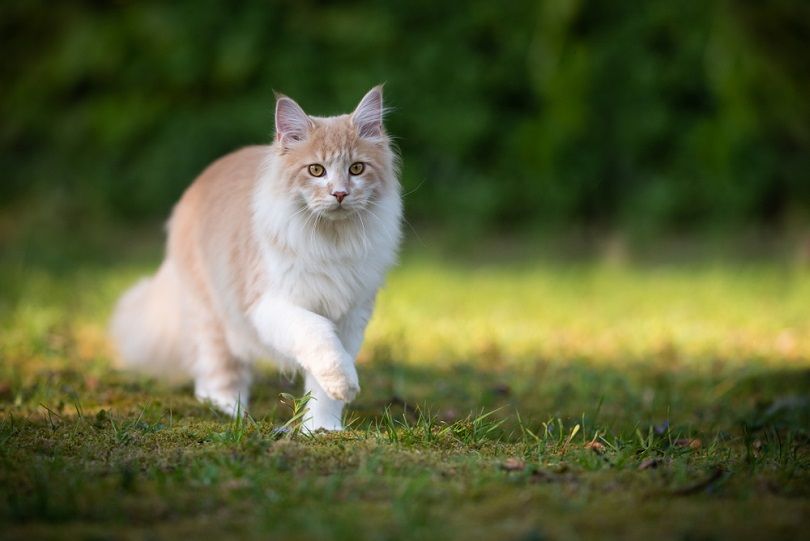
Cats don’t understand or sense time in the same ways as humans, but they interpret the passage of time based on things like their internal body clocks, hunger, and observation of your activities. They can also accurately judge the time between events that regularly occur around them, allowing cats to determine when it’s time for you to get up based on cues from the sun and regular observations of your morning routine.
How Cats Tell Time
Cats understand time primarily based on what happens around them and collect reference points from several sources, including your routine and their own feline circadian rhythms, to create a pattern used to understand and anticipate what’s supposed to happen at various times of the day.

Household routines
Cats associate various times with particular activities, such as eating, playing, and cuddling. They also internalize the order in which activities occur and understand that their human usually wakes up, makes breakfast, and then feeds them. And they also have a good sense of the length of time between activities, like the neighbor pulling into their driveway and you arriving home.
Internal Body Clocks
Cats have internal body clocks that anchor their daily rhythms around their preferred hunting times— dusk and dawn. Their biological clocks trigger them to wake up around dawn and become energetic again just before and after sunset. This reliance on the sun explains why cats don’t adjust well to Daylight Savings Time.

Hunger Cues
Felines rely on hunger cues to know when it’s time for breakfast and dinner, which gives them further reference points for the passage of the day. So, while kitties may not be able to tell time accurately in human terms, they experience the passage of time and expect certain activities to occur in patterns. But cats probably don’t know what day it is automatically, as evidenced by the feline tendency to ignore its owner’s weekend sleeping patterns.
Do Cats Get Lonely?
Absolutely! Cats in one scientific study initiated contact more frequently and engaged with their owners in affectionate ways more often after being separated. Cats often form attachments to their people that resemble those between human parents and children. However some veterinarians suggest that cats don’t have a deep-seated need to bond with humans but instead choose to become attached to specific people based on how they’re treated and that particular cat’s level of socialization.
Cats can suffer separation anxiety when left to fend for themselves for too long. Solo, indoor female cats tend to be diagnosed with the condition more often than other pets. Common indications of a cat suffering from separation anxiety include excessive meowing, litter box issues, excessive licking, and destructive behavior.
Reach out to your veterinarian if you suspect your cat is suffering from anxiety for any reason. Some physical conditions can cause similar behavior, so your veterinarian may want to rule those out before diagnosing your pet as suffering from separation anxiety.

How Long Can Cats Be Left Alone?
Most healthy adult cats can be left alone for 8 hours or so. While cats sleep much of the time when their humans are away, most benefit from having toys, games, and food puzzles to keep them entertained during those hours when they’re home alone.
Some cats, including Siamese and Abyssinian kitties, have high socialization needs and often require a fair amount of attention to thrive. These sensitive cats often do fine on their own if they have enough activities to keep them entertained. Senior cats often require more attention, particularly if they’re not feeling well or have difficulty getting around. Kittens should only be left alone for a few hours, although they can stay by themselves for more extended periods as they grow.
Healthy adult cats can be left for around 24 hours if you provide sufficient food and water. Timed dispensers make it possible to ensure your pet eats at their regular time if you’re going to be away for a night. And they also prevent cats from eating all their food at once!
You can hire a pet sitter to come and give your cat a bit of love if you’re going to be gone for longer than one night. Not only will a visit or two help keep your pet from getting bored and lonely, but the sitter can also make sure everything is going as planned, double-check to ensure your pet’s feeder is working properly and clean your cat’s litter.
Conclusion
Cats can tell time, but they do so in a different way than humans! Kitties use the environment to determine what’s supposed to be happening and when. Their internal clocks wake them up and encourage them to be more active around sunrise and sunset.
They also rely on regular household activities and patterns to learn how your family’s days generally unfold. They’re good at gauging the time between events, such as you arriving home and giving them dinner, and they also use hunger signals as clues to help them determine the time.
Featured Image Credit: Piqsels






